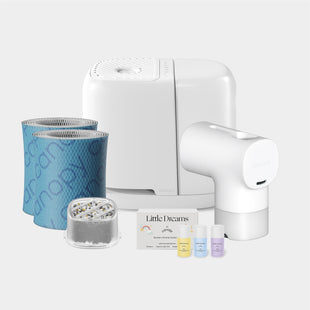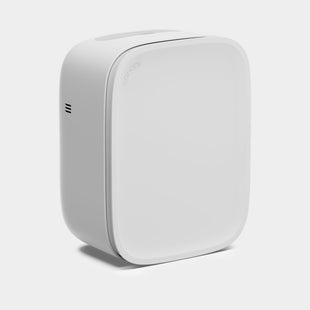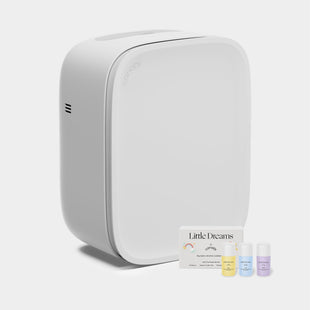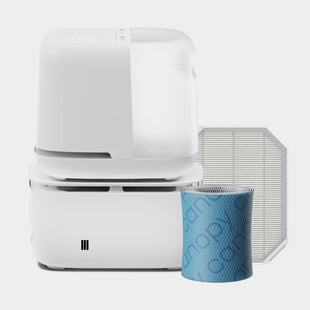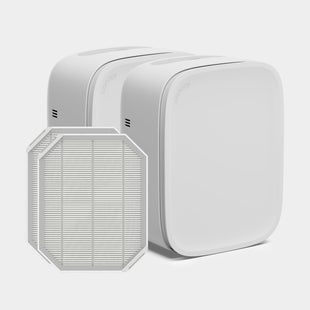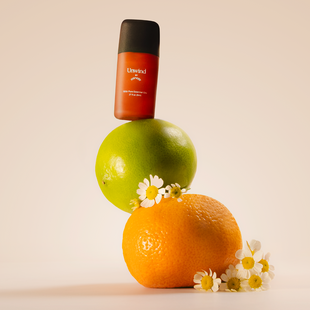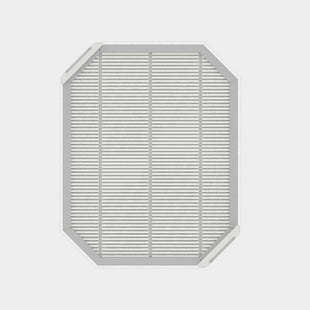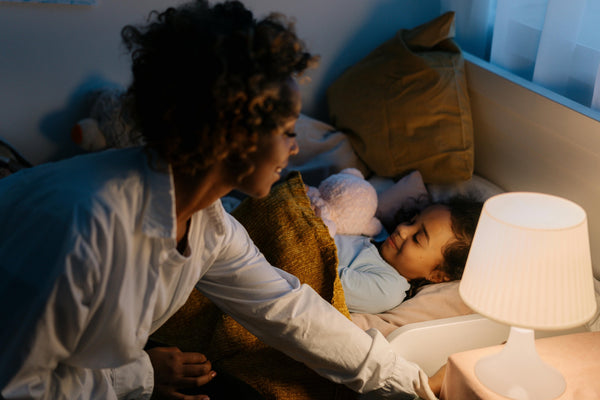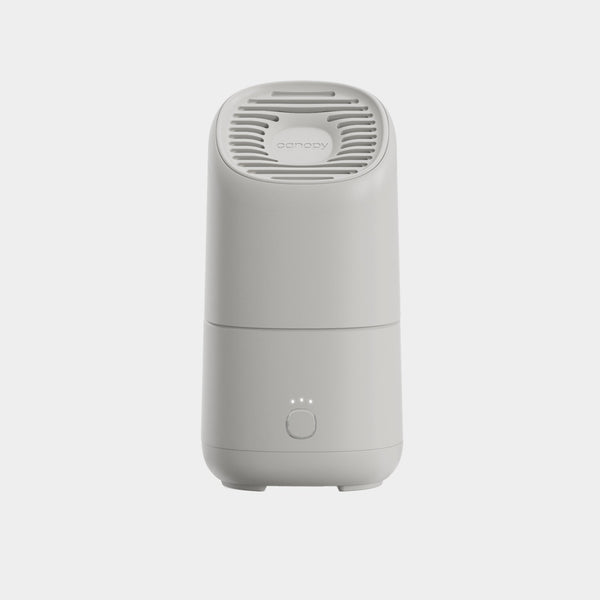At Canopy, we dedicate ourselves to developing simple but smart solutions to improving at-home beauty and wellness routines. While a balanced diet, exercise, and hydration are all (rightfully) touted as primary avenues to better health, one area that’s often neglected is sleep. Consistently getting good-quality sleep goes a long way in making you look and feel better, from improving your mood and memory to helping your body fend off illness and recover from the day.
For babies and children, getting enough sleep is essential for growth and healthy development. Kids need to sleep longer than adults, but like us, they can face obstacles when trying to get a good night’s rest. That’s why it’s important for parents to build sleep schedules and routines for everyone and to emphasize the value of quality sleep as a family.
We understand how easy it is to forget or forego self-care in the hustle of everyday life, but reclaiming your rest is the first step toward a healthier, more wholesome lifestyle. We’re here to help you upgrade your sleep routine one step at a time. This guide covers the benefits of good sleep, the distractions that may be interrupting your family’s rest, and how you can minimize these challenges.
Why Is Sleep Important?
What It Means to Get Good Quality Sleep

Not all sleep is good sleep. Most adults need at least 7 hours of sleep each night to feel well-rested, but it is possible to still wake up groggy when you thought you went to bed early enough. Getting good quality sleep means:
- Falling asleep quickly, within 30 minutes of going to bed
- Getting the recommended amount of sleep for your age group
- Sleeping through the night with minimal interruptions
- Falling back asleep within 20 minutes if you do wake up
- Feeling refreshed and energized in the morning
One night of poor-quality sleep can be enough to affect your mental, emotional, and physical well-being, so a consistent lack of rest can have long-term consequences. You may feel tired, irritable, stressed out, and emotionally exhausted early in the day. It can feel difficult to concentrate, stay alert, or remember important things, which can affect work or academic performance. Sleep deprivation can also slow your reaction time, making driving more dangerous.
Some people will feel hungry more often and find themselves craving junk food, potentially leading to weight gain. Others may develop red or puffy eyes, pale skin, or acne. There’s also evidence that a lack of sleep can accelerate the aging process and lead to wrinkles. More serious effects include an increased risk of diabetes, heart disease, Alzheimer’s disease, and other health problems later in life.
Common Sleep Disruptors
Do you know what’s preventing you from getting a good night’s rest? Many sleep disruptions are caused by one’s lifestyle and activities. Your sleep routine and habits are known as your sleep hygiene—and having good sleep hygiene is an important factor in how well-rested you feel each morning. Common behaviors that indicate poor sleep hygiene include:
- Drinking caffeine or alcohol too close to bedtime
- Eating too much food before bed, especially greasy or fatty food
- Having an irregular sleep schedule
- Napping too much during the day
- Exercising too close to bedtime
- Watching TV or using your phone or computer before bed
While changeable, these habits will take time and effort to improve. Some factors are environmental and harder—but not impossible—to control:
- Temperature extremes: If you’re uncomfortable with the temperature of the room, it can distract you from falling asleep.
- Outdoor noise: People living in cities or on busy streets often deal with disruptive noises that interrupt or prevent sleep, but white noise can help. White noise combines every audible frequency into one consistent sound, which allows your mind to block out harsh noises.
- Bright lights: Whether from your home or a street light outside your window, bright lights suppress the production of melatonin in your body. This hormone plays an important role in your sleep cycle and circadian rhythm, helping your body wind down at night.
- Humidity levels: Dry air affects not only your skin but also your sleep quality. When the air in your room is too dry, it can cause dry nasal passages, congestion, sore throat, and itchy eyes, making it harder to fall and stay asleep.
Sleep disorders, like sleep apnea, can also keep you from getting enough rest. This condition is characterized by temporary and sudden lapses in breathing as you sleep, which can result in snoring, gasping, or choking sounds. Those with sleep apnea may or may not fully wake up, but these disruptions have a negative impact on sleep quality.
Sleep apnea is most commonly treated with a continuous positive airway pressure (CPAP) machine. While effective at keeping breathing airways open, they can be uncomfortable to use and dry out your throat and nasal passages when the air in your room lacks adequate moisture. If you have sleep apnea, using a humidifier alongside your CPAP machine will help you rest more comfortably.
Tips to Improve Your Sleep Routine
In addition to the recommendations above, there are steps you can take to improve your sleep routine and hygiene. Follow these tips on how to sleep better at night:
- Stick to a sleep schedule: A set sleep schedule gives your body a consistent sleep-wake cycle. Choose a fixed wake-up and bedtime and try to stick to it, whether it’s the weekday or weekend. Avoid late or too much napping during the day, which can throw off your nightly sleep schedule.
- Create a nighttime routine: Following a calming ritual tells your body it’s time to wind down and go to sleep. At least 30 minutes before bed, avoid bright screens and electronics. Try things that put you at ease, such as meditation, gentle yoga, listening to soft music, or reading. Taking a warm shower or bath can help you relax.
- Prepare your environment for sleep: Calming fragrances, like lavender and chamomile, also help relieve stress and promote rest, so try diffusing essential oils before bedtime. Add these aroma oils to your Canopy humidifier using an Aroma Stone or to the felt diffuser that comes with our Filtered Showerhead.
Sleep Quality for Babies & Children
How Children’s Sleep Needs Change Over Time

From infancy to young adulthood and beyond, sleep plays a critical role in every new stage of life. Sleep quality directly affects development, affecting learning, memory formation, attention, emotional regulation, motor skill development, and physical growth. Getting enough sleep is also important for a healthy immune system, which may help your child get sick less often and heal from injuries faster.
How much should your child sleep each day? Babies, children, and teens all need more sleep than adults, but the recommended hours depend on their stage of development:
- Newborns (0–3 months old): 14–17 hours a day
- Babies (4–12 months old): 12–16 hours a day, including naps
- Toddlers (1–2 years old): 11–14 hours a day, including naps
- Preschool-age children (3–5 years old): 10–13 hours a day, including naps
- School-age children (6–12 years old): 9–12 hours a night
- Teenagers (13–17 years old): 8–10 hours a night
What Challenges Do Children Face Trying to Sleep?
As kids grow, various factors can prevent them from sleeping soundly. This includes challenges resulting from different developmental stages. Here are the most common sleeping problems faced by each age group:
- Newborns: Newborn babies generally don’t sleep through the night; instead, they sleep for short stretches throughout the day. Newborns can’t really tell the difference between night and day at this point. They tend to be fussy and will frequently need to be fed, changed, or soothed. Parents might be tempted to keep them awake during the day to ensure a quiet and restful night, but this will only make it harder for them to fall asleep at night.
- Babies: After a few months, babies will start to show a more regular sleep pattern, sleeping about 9 hours at night with naps during the day. Even so, your baby may cry out in the middle of the night. Sometimes, this is because they miss their parents, a normal part of this stage of development. Additionally, babies are more sensitive to temperature, so they may be cold and uncomfortable. Try setting the thermostat a degree or two warmer than usual, up to 69°F.
- Toddlers: Toddlers might wake up in the middle of the night when they’re sick or teething. At this stage of development, they’re also more likely to start experiencing nightmares. It can be hard for them to separate dreams from reality, so avoid scary stories before bed and consider giving your toddler a comfort item, like a stuffed animal or blanket.
Many parents begin introducing their children to media when their kids reach the toddler stage, but try to limit screen time to 1 hour per day of high-quality educational programming. Avoid screen time before bed so you don’t disrupt your child’s sleep routine.
Even kids who are old enough to have an established sleep routine can face challenges getting through the night. Here’s what parents might encounter as their kids move into the next age groups:
- Preschoolers: By preschool age, children are far more active and may not want to nap. Your child may still need naps if they seem extra tired during the day. Even if they don’t nap, they still need time to wind down and relax, especially if they exhibit hyperactivity. Kids at this age may be afraid of the dark, so a nightlight with a soft, warm glow can soothe their nerves.
- School-age children: As children reach school age, their lives become much busier. Homework, sports, after-school activities, family schedules, socializing, and screen time can fill their days and sometimes get in the way of a good night’s sleep. Make sure your child has a set sleep schedule, and teach them a bedtime routine that will help them relax.
In addition to nightmares and night terrors, children at this age can start to experience insomnia, sleep apnea, and sleepwalking. If your child can’t fall asleep easily, seems excessively sleepy during the day, or wakes up a lot at night, talk to a pediatrician or family doctor.
Teenagers also experience challenges with sleep quality and quantity. In fact, studies show that 60–70% of teens aren’t getting enough sleep. This can happen for a lot of reasons, including packed schedules, early school start times, lots of homework and tests to study for, and the increased use of electronic devices. Another reason is that at this stage, their internal clock shifts later, so they simply don’t feel tired until later at night. While teens are starting to become more independent, it’s still important to encourage a healthy sleep schedule and routine.
How to Help Children Sleep Better
Like adults, children need to build good sleep hygiene. In fact, it’s best for parents to instill good habits when kids are young. This will reinforce the importance of quality sleep and sticking to a sleep schedule. Schedules create consistency for children, showing them how to lead healthy lives.
Nighttime routines can start as early as infancy. Give your baby a dark, calm environment to sleep in. Reading bedtime stories, singing lullabies, or simply talking gently to your baby may help them fall asleep. White noise can give your baby feelings of comfort and security while preventing sudden noises from startling them awake. The gentle white noise of our Nursery Humidifier, loved by parents and designed to promote easier breathing and better sleep, can help soothe your baby into a comfortable rest.
As they get older, your child’s nighttime routines will start to more closely resemble yours. With a consistent sleep schedule and Canopy’s mold-inhibiting* design clean moisture humidifier, your family can rest easier and benefit from a full night of quality sleep.
Establishing a Sleep Routine With Canopy
Why is sleep important? Even though we know a lot about the benefits of a good night’s sleep, researchers are still uncovering the full extent of how sleep supports our health. What we know for sure is that the benefits of good sleep span far and wide—and getting enough of it is important for our mind, mood, and body. We also know that inadequate sleep puts us at risk for a number of health conditions, from heart disease to dementia.
Your brain begins priming your body for sleep hours before you actually go to bed. As we’ve established, certain activities can disrupt this natural circadian rhythm, but there are also plenty of things you can do as the day winds down to support your sleep cycle.
Here are some steps for a sleep routine that helps you transition from evening activities to bedtime.
Limit Caffeine
If you’re wondering how to sleep better at night, take a look at your caffeine intake. An afternoon coffee or tea might give you a short-term jolt, but it could also keep you tossing and turning hours later.
The right cut-off time varies depending on each individual’s sensitivity to caffeine, but a good rule of thumb is to avoid anything caffeinated 6 hours before your anticipated bedtime. Quantity matters, too: While adults may tolerate up to 400 mg of caffeine per day (4 cups of coffee), less is more when it comes to improving your sleep routine.
Practice Movement Every Day
While not necessarily part of a sleep routine, exercising each day can be an important factor in facilitating quality rest. Moderate-intensity aerobic exercise—walking or swimming, for example—can increase deep sleep, which gives your mind and body the opportunity for restoration.
Timing is important: Exercise releases endorphins and spikes your core body temperature, both of which can make it challenging to nod off. For best results, aim to schedule your workouts at least 2 hours before bed.
Stick to the Same Sleep Schedule
When the day is winding down, and your bed is calling, try to begin your nightly routine at roughly the same time each evening. Consistency will reinforce your circadian rhythm, reminding your mind and body that rest is approaching.
Unwind Your Way
For many people, the hours before bed are the only time that’s truly theirs throughout the day. Work is over, chores are done, and with any luck, children and pets are resting. How you choose to unwind during this window is up to you.
Just know that some activities will naturally be more stimulating—and thus prohibitive to sleep— than others. Activities that can encourage rest include:
- Listening to calming music
- Having a light snack (think yogurt, fruit, or nuts)
- Reading a book
- Journaling
- Creating a to-do list for the following day
- Meditating
Rinse the Day Away

Showering before you sleep is another activity that can alert your brain that bedtime is near. Warm water is physically soothing and mentally relaxing. As a bonus, it also ensures you’re getting into bed fresh and clean—and ideally, without any residue from hard, mineral-rich water. Leave your skin smooth and ready for sleep with our Filtered Showerhead, which won’t strip natural oils and ensures you receive only the purest hydration.
Create a Soothing Environment
Lastly, being in a sleep-friendly environment can make it easier to drift off into dreamland. Here are some essentials to have in your sleeping space for quality slumber:
- Cool temperatures: The best temperature for sleep is probably cooler than you might think. Set your thermostat to 65 to 68 degrees Fahrenheit for optimal conditions. Cooling fabrics, fans, and opening windows can also help keep you from getting too warm, especially if you can’t control the thermostat.
- White noise: Defined as one uniform sound made up of all audible frequencies, white noise can mask environmental disruptions, like horns and barking dogs. That means it helps you fall asleep easier and stay asleep. The soft hum of our humidifier fan helps redirect your attention away from the sounds you can’t control and toward a more restful state.
- Darkness: Since your brain associates light with the wake cycle, darkness is essential for sleep. Keep your room free of light, including that from devices, like your TV, phone, or tablet. Ideally, you’ll want to avoid screens for up to 2 hours before bed. At the very least, reduce blue light exposure by switching devices to night mode. If exterior lights are keeping you up, installing opaque blinds or blackout curtains can make a meaningful difference. When you do need light at night, the Canopy Bedside and Nursery humidifiers now feature warm nightlights and a gentle red light for helpful illumination that is softer than overhead lighting or a lamp.
- Home hydration: Many indoor environments have insufficient moisture, especially as the weather cools down. Dry air can lead to congestion, itchy skin, snoring, and worsening allergy symptoms—all of which are barriers to quality sleep. Fortunately, our humidifier solves these issues by achieving the ideal indoor moisture levels of 40% to 60%. These devices can be placed in virtually any sleep environment and can run all night to deliver consistent hydration.
- Aromatherapy: The final component of a sleep-friendly space might surprise you. A soothing scent, like chamomile, peppermint, or lavender, creates stress-relieving sedative effects by triggering hormones associated with better sleep. All Canopy devices allow you to add your favorite Aroma Kit fragrances to create the ideal conditions for a restful night. Use the Aroma Stones with any of our devices for a light, long-lasting scent you can change as often as you’d like, or the Diffusion Well now available in the Bedside and Nursery humidifiers as well as the Large Room Humidifier for a single fragrance that lasts for days.
Better Sleep for Babies & Children
Like us, babies and children can benefit from a consistent, sleep-promoting bedtime routine. Rest may be especially important for the littlest members of our family since their growth and development hinge on the restorative period their minds and bodies undergo during sleep. It’s no surprise that children also need more sleep than adults: for infants, that’s up to 17 hours a day, while teens may need 10 hours.
Of course, actually getting your child to sleep isn’t always easy. From sleep regressions to transitioning into a “big kid” bed, there are plenty of milestones that pose challenges for parents and children alike. While bedtime might not always go exactly as planned, the following tips can help you establish a solid framework you can modify as needed.
Develop a Consistent Routine
From infancy, you can begin establishing a consistent sleep routine. Some parents find that the three B’s work well:
- Bottle or breast: Your baby’s last feed of the day might start the winding down process for bedtime.
- Bath: As with adults, warm, soothing water can help facilitate restfulness in babies and children.
- Book: Reading to children before bed has been associated with a better quality of sleep.
During the early years of their lives, children’s wake windows change as their sleep needs evolve. This means you’ll need to adjust the start of their bedtime routine as they grow. Try to do so gradually, bumping the time up or moving it back by 5-minute increments as needed.
Keep Them Busy During the Day
It’s bedtime, and suddenly, your toddler is running laps around the house. If that sounds familiar, you’re not alone. Young children have seemingly endless stores of energy, and when bedtime is imminent, they’ll try to delay it in favor of more play. The antidote lies in providing plenty of opportunities for active play throughout the day. Even in infants, activities like tummy time can ensure your little one is moving enough to become genuinely tired by bedtime.
There are no set physical activity standards for toddlers and preschoolers, but aim to have them moving frequently throughout the day with activities like trips to the playground, backyard play, and indoor obstacle courses. Children aged 6 to 17 should get at least an hour of exercise daily, which can come from family walks, bike rides, and sports.
Provide Choices
Toddlers, preschoolers, and elementary school children appreciate opportunities to exercise independence. Giving them a say in some aspects of their bedtime routine may make the process smoother and prevent power struggles, which can be upsetting for parents and children alike. Consider inviting them to pick their own bedtime stories or choose their pajamas, for example.
Create a Dedicated Sleep Space
Babies need their own sleep space for safety reasons, but having a dedicated sleep space remains beneficial as children grow up. Middle schoolers and teens often have many responsibilities to juggle, including school, sports, a social life, homework, and extracurriculars. By encouraging them to dedicate their room mostly to sleep, you can strengthen the association between slumber and their bed.
Create a separate quiet space where they can do homework elsewhere in the home. If space is limited, then create zones in your child’s room where they can focus on tasks. While reading in bed can be relaxing, it should be leisure reading instead of homework.
Bathe Before Bed
Whether they’re crawling on the floor or playing outside, kids will encounter lots of germs as they grow. Avoid bringing them to bed with a nighttime bath or shower. Keep in mind that children’s skin tends to be more sensitive than an adult’s, so the importance of a filtered shower head can’t be overstated. Eliminating harsh minerals and chlorine with a Canopy shower head can help minimize dry skin, symptoms of eczema, and other skin woes in little ones.
Set Up Their Sleep Environment

Like us, children of all ages can enjoy a better sleep routine when their environment is conducive to slumber. Mimic the environment you’ve created in your bedroom in your children’s sleep environment by incorporating the following elements.
- Cool temperatures: Again, keeping your home comfortably cool can benefit you and your children alike, so aim for the mid- to upper 60s, if possible.
- White noise: A staple in any new parent’s toolkit, white noise can help babies block out sounds that would otherwise disrupt their sleep. Canopy humidifiers create a soft, consistent soundtrack ideal for nurseries and older children’s bedrooms alike.
- Darkness: Babies are especially sensitive to light, so a dark room is a must for quality sleep. You might consider blackout shades to help your newborn sleep. As they grow, continue to keep their room dark and set boundaries to ensure school-aged children aren’t using devices right before bedtime. If your child is afraid of the dark or needs a soft light during nighttime bathroom visits, the updated Canopy Nursery Humidifier has light modes that provide gentle illumination.
- Home hydration: Because their systems are still developing, babies are more prone to having sensitive skin and congestion—issues that can be exacerbated with dry indoor air. Keep them comfortable with the Canopy Nursery Humidifier, a safe, clean-moisture humidifier with evaporative mist technology. The device can follow them through childhood and is perfect for toddlers, kids, and teens. Don’t be surprised if your teen takes their humidifier with them to college or their first apartment.
- Aromatherapy: Soothing fragrances can calm children and adults alike. For a gently comforting aroma that won’t overpower their environment, diffuse calming scents in your child’s humidifier by dropping a few drops of their favorite essential oil on the Aroma Stone of your Canopy humidifier.
Whether you’re a college student seeking a healthier sleep environment or a new parent looking to enhance sleep hygiene for the whole family, Canopy supports a healthy sleep space through every phase of life. We offer a range of humidifiers to suit every area, from the Canopy Nursery Humidifier to our revamped Bedside Humidifier. Our Large Room Humidifier is designed for spaces up to 1,000 square feet, offering benefits throughout the home. The award-winning Portable Humidifier is ideal for keeping your environment pleasantly hydrated when you’re trying to sleep away from home.
If showering is part of your nighttime relaxation ritual, count on our shower heads to provide healthy hydration for skin and hair, along with soothing water pressure. Our Handheld Filtered Showerhead is especially useful for those with mobility challenges and parents bathing their little ones—and it features the same filtration and aroma features customers love about our original Filtered Showerhead. Both shower devices are easy to install and will eliminate irritants, like hard minerals and chlorine, from your home’s water supply.
We go beyond home hydration to facilitate a more soothing space both mentally and physically, thanks to our built-in aroma features and signature fragrance oil collections. Our blends are designed to make your home feel more relaxing and inviting, so you’re sure to find the perfect scent for sweeter dreams.
*Mold inhibition limited to device interior. Does not treat air or environment. 3rd party lab-tested with Aspergillus niger (ATCC 6275, 16404).









